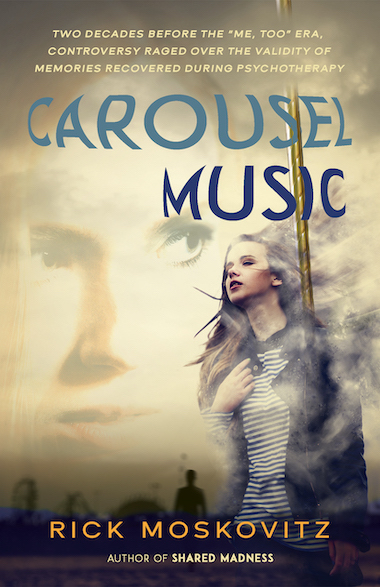 Carousel Music by Rick Moskovitz
Carousel Music by Rick Moskovitz
Carousel Music is a “She said, he said” mystery, set two decades before the “Me, too” era during a time when controversy raged over the validity of memories recovered during psychotherapy. As knotty as the dilemma of when to believe women who claim that they were violated as adults, what if the victim was a child and the perpetrator was her father? And what if she had no recollection of the trauma before undergoing psychotherapy as an adult and her father was so certain that he never did it that he sued the doctor in order to clear his name?
Stephanie Whittington lands in the care of Dr. Kenneth Miller with few childhood memories and little sense of who she is. In the course of her treatment, the pictures from her childhood gradually fill in to create a personal narrative that forms the foundation for a growing sense of identity. But what if parts of that narrative turn out not to be true?
At stake is Stephanie’s recovery, her father’s reputation, and the doctor’s career. What really happened? As memories form and evolve over time, nothing is ever exactly as it appears.
Targeted Age Group:: Adults only
Heat/Violence Level: Heat Level 5 – NC-17
What Inspired You to Write Your Book?
Carousel Music is set shortly after the turn of the Millennium, at a time when controversy raged about the validity of memories recovered during psychotherapy. During the nineties, many psychotherapists believed that discovering memories of trauma, including particularly sexual trauma, was key to the recovery of patients from symptoms typical of post-traumatic stress disorder, eating disorders, and addictions.
As a consequence, some patients uncovered memories of trauma that included incest and other abusive relationships, and more than a few confronted their alleged abusers. The term False Memory Syndrome was coined and a number of lawsuits followed, some brought by accused family members and some by patients.
During a long career as a psychiatrist, during which I wrote Lost in the Mirror: an inside look at Borderline Personality Disorder, I developed an interest in learning about how memories are created and how they evolve over time. I came to understand that memory is highly subjective, more like a painting than a photograph, influenced by context, including particularly emotions that accompany events. And I also realized that memories of events change, sometimes subtly and sometimes substantially, over time.
With Carousel Music, I undertook through a fictional account to provide a balanced view of the False Memory controversy as well as to show some of the ways in which memory evolves.
How Did You Come up With Your Characters?
Stephanie, my main character, was inspired by many of the patients I encountered during my career, who struggled to overcome the demons from their past while wrestling with the demons within that threatened to destroy them. Everett, her father, was inspired by a number of my patients who were burdened by their addictions and their consequences and who recovered self-respect and serenity in the rooms of Twelve Steps Recovery. Kenneth, the psychiatrist, reflects some of the naivete of my younger self in my early years of practice. The attorneys were inspired by those I encountered as an expert witness in the courtroom. And Dr. Benjamin Kobic, the defense's expert witness, stole into my home in the dead of night, inhabited my computer, and wrote his own story the next morning.
Book Sample
As old as everything had appeared on the outside, inside Dr. Kobic’s office was like a museum. Against the walls were oak barrister bookcases, antique counterparts of the ones in Burton’s office, with glass doors framing each shelf. Most of these cabinets contained row after row of well-worn leather-bound books. One corner of the room, however, was flanked by two large cabinets that contained what appeared to be very old pottery and objects made of ivory and of silver.
Stephanie had been ushered into the office by the receptionist. When the doctor entered the room, she was looking intently at the pottery in the corner shelves.
“Do you like old things?” asked the doctor. “Would you like a closer look at any of them?” He lifted the glass door in front of an upper shelf and removed a mottled piece of pottery that sat on a three-pronged wire stand.
“Here, take it,” he said, handing it to her. “Don’t be shy.” Stephanie turned the object in her hands, examining it in detail.
Although its surface was irregular in texture, its shape was very graceful and it appeared intact. There were no signs of cracks or patches. It was a jug, an amphora, with a narrow neck and round handle and tapered at the bottom to end in a point.
“What you are holding is nearly four thousand years old. It’s from the Bronze Age and most likely Canaanite. Everything you see here is very, very old. Most of it comes from archeological digs in what is now Israel. They connect me with my heritage. Knowing about our past is terribly important.”
Stephanie had still not uttered a word. She looked up from the ancient vessel in her hands at the kindly face of the aging physician, who appeared to belong among his antiquities.
Links to Purchase Print Book version – Click links for book samples, reviews and to purchase
Buy Carousel Music Print Edition at Amazon
Links to Purchase eBook version – Click links for book samples, reviews and to purchase
Buy this eBook On Amazon
About the Author
Learn more about the author on their website
Follow the author on Amazon
Follow the author on Social Media:
Facebook
Twitter
Goodreads
Instagram
LinkedIn
YouTube Channel
All information was provided by the author and not edited by us. This is so you get to know the author better.
